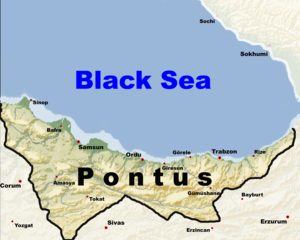| Pontus region around Trapezus. (Photo credit: Wikipedia) |
The community lives in a cluster of villages near the Turkish city of Trabzon in what was once the ancient region of Pontus, a Greek colony that Jason and the Argonauts are supposed to have visited on their epic journey from Thessaly to recover the Golden Fleece from the land of Colchis (present-day Georgia). Pontus was also supposed to be the kingdom of the mythical Amazons, a fierce tribe of women who cut off their right breasts in order to handle their bows better in battle.
Linguists found that the dialect, Romeyka, a variety of Pontic Greek, has structural similarities to ancient Greek that are not observed in other forms of the language spoken today. Romeyka's vocabulary also has parallels with the ancient language.
Ioanna Sitaridou, a lecturer in romance philology at the University of Cambridge, said: "Romeyka preserves an impressive number of grammatical traits that add an ancient Greek flavour to the dialect's structure, traits that have been completely lost from other modern Greek varieties.
"Use of the infinitive has been lost in all other Greek dialects known today – so speakers of Modern Greek would say 'I wasn't able that I go' instead of 'I wasn't able to go'. But, in Romeyka, not only is the infinitive preserved, but we also find quirky infinitival constructions that have never been observed before – only in the Romance languages are there parallel constructions."
The villagers who speak Romeyka, which has no written form, show other signs of geographic and cultural isolation. They rarely marry outside their own community and they play a folk music on a special instrument, called a kemenje in Turkish and Romeyka or lyra as it is called in Greek, Dr Sitaridou said. "I only know of one man who married outside his own village," she said. "The music is distinctive and cannot be mistaken for anything else. It is clearly unique to the speakers of Romeyka."
One possibility is that Romeyka speakers today are the direct descendants of ancient Greeks who lived along the Black Sea coast millennia ago – perhaps going back to the 6th or 7th centuries BC when the area was first colonised. But it is also possible that they may be the descendants of indigenous people or an immigrant tribe who were encouraged or forced to speak the language of the ancient Greek colonisers.
Romeykas-speakers today are devout Muslims, so they were allowed to stay in Turkey after the 1923 Treaty of Lausanne, when some two million Christians and Muslims were exchanged between Greece and Turkey. Repeated waves of emigration, the dominant influence of the Turkish-speaking majority, and the complete absence of Romeyka from the public arena, have now put it on the list of the world's most endangered languages.
"With as few as 5,000 speakers left in the area, before long, Romeyka could be more of a heritage language than a living vernacular. With its demise would go an unparalleled opportunity to unlock how the Greek language has evolved," said Dr Sitaridou. "Imagine if we could speak to individuals whose grammar is closer to the language of the past. Not only could we map out a new grammar of a contemporary dialect but we could also understand some forms of the language of the past. This is the opportunity that Romeyka presents us with."
Studies of the grammar of Romeyka show that it shares a startling number of similarities with Koine Greek of Hellenistic and Roman times, which was spoken at the height of Greek influence across Asia Minor between the 4th century BC to the 4th century AD.
Modern Greek, meanwhile, has undergone considerable changes from its ancient counterpart, and is thought to have emerged from the later Medieval Greek spoken between the 7th and 13th Centuries AD – so-called Byzantine Greek.
Future research will try to assess how Pontic Greek from the Black Sea coast evolved over the centuries. "We know that Greek has been continuously spoken in Pontus since ancient times and can surmise that its geographic isolation from the rest of the Greek-speaking world is an important factor in why the language is as it is today," Dr Sitaridou said. "What we don't yet know is whether Romeyka emerged in exactly the same way as other Greek dialects but later developed its own unique characteristics which just happen to resemble archaic Greek.
Many of the world's languages are disappearing as once-isolated populations become part of the global economy, with children failing to learn the language of their grandparents and instead using the dominant language of the majority population, which in this part of the world is Turkish. "In Pontus, we have near-perfect experimental conditions to assess what may be gained and what may be lost as a result of language contact," Dr Sitaridou said. republic-pontus





